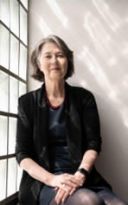Martha Merrow is a professor of medical psychology and former head of the Institute of Medical Psychology at the LMU Munich, one of Europe’s leading institutions for research and education. She grew up in the U.S. and majored in Biology at Middlebury College before attending graduate School for Immunogenetics at the Tufts University School of Medicine. Merrow started studying the circadian clock during her post-doctoral work at Dartmouth Medical School in 1991 and specialized further in this field at the LMU Munich between 1996 and 2004. She attained her first professorship as part of a Rosalind Franklin Research Fellowship award at the University of Groningen in 2004. She was ‘called’ back to the Institute of Medical Psychology at LMU Munich in 2012 where she currently served as its Chair until her mandatory retirement in 2023. The research of the Merrow group is focused on entrainment of the circadian clock including in humans as well as the discovery of new model systems in which to study circadian rhythms. Her most recent work in this direction describes circadian properties in Bacillus subtilis, a non-photosynthetic prokaryote representative of a category that includes 12% of life on earth. Martha Merrow has served the community as secretary (2010 - 2012) and member at large (2006-2008) of the Society for Research on Biological Rhythms, and President-elect (2015-2019) and President of the European Biological Rhythms Society (EBRS, 2019 - 2023). She spearheaded a new, low (environmental) impact conferencing model (CArbon-REduced or CARE Conferencing) prior to the pandemic (https://shorturl.at/uFOR6). The format was further used during the pandemic to shine light on how chronobiology could contribute to COVID-research (https://shorturl.at/nprDV). She has organized ‘Clock Clubs’ in the Netherlands and Germany which have served as focal points for consortium funding. She has been involved in European level consortium funding (EUCLOCK/funded, SYSTIME/not funded and MicroClock/funded). She has organized female faculty members in Groningen (The Women’s Table) and in Munich (Frauentisch). She was elected as a member of the European Academy of Science and Arts in 2015. With her teaching, Merrow has extensively served the communities of medical students and of chronobiology.




